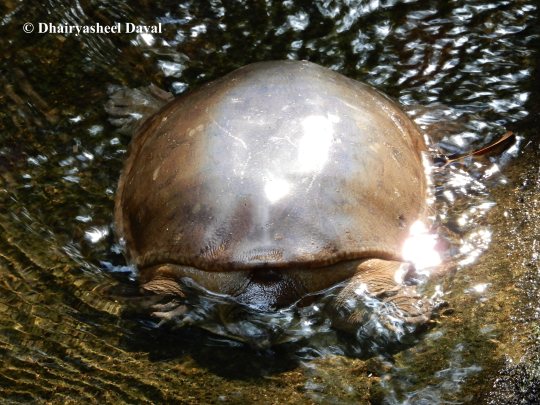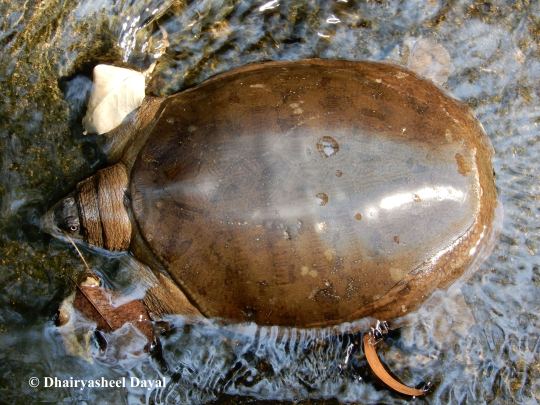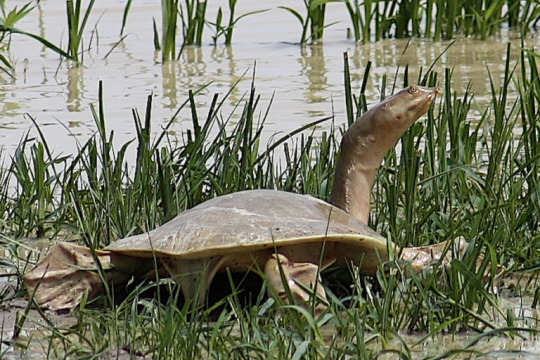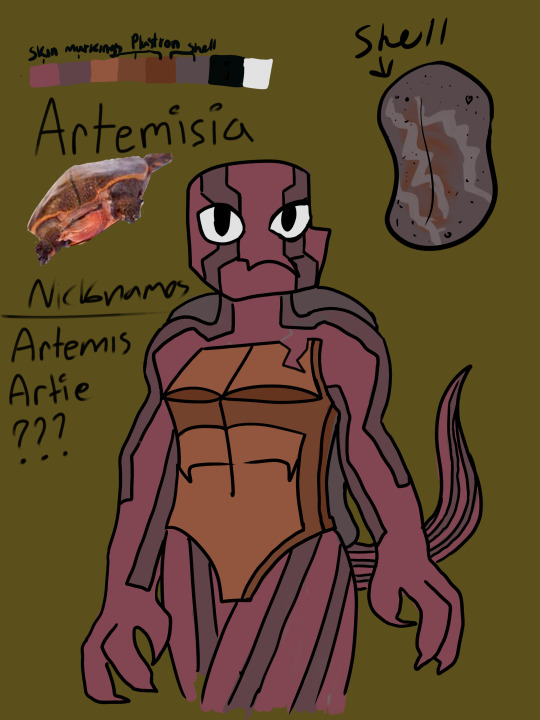#flapshell turtle
Explore tagged Tumblr posts
Text

Burmese Flapshell (Lissemys scutata) hatchling, family Trionychidae, found in a garden in Letpandan, Myanmar
Photograph by Kyawphyo Thu
1K notes
·
View notes
Text





The Indian flapshell turtle (Lissemys punctata).
Conservation Status: VULNERABLE.
#indian flapshell turtle#flapshell turtle#turtle#turtles#reptile#reptiles#freshwater turtle#freshwater species#freshwater animal#freshwater#aquatic#aquatic wildlife#wildlife#wildlife of india#wildlife photography#turtles of maharashtra#turtles of india#indian wildlife#shells#shell#vulnerable#vulnerable species
7 notes
·
View notes
Text
#2903 - Lissemys punctata - Indian Flapshell Turtle

Happily paddling around one of the 600-year-old artificial pools at Hampi.
A common and widespread freshwater turtle in South Asia, mistakenly placed on the CITES Appendix I in 1975, but taken off the endangered species list again later when they realised that that status only applied to one subspecies.
Found in lakes, ponds, rivers, drainage ditches, and even desert ponds. In summer, when some water bodies dry out, they crawl to another or burrow into the sand or mud at the bottom of the pond. Generally omnivorous.
Courtship begins with the male stroking the female's carapace with his neck and limbs extended. If receptive, she'll face him and they'll bob their heads vertically three or four times. Near the end of mating, the male releases his grip and rotates to face the opposite direction from her, and may be dragged around by the female for up to quarter of an hour.
A protected species, but widely poached for supposed aphrosdiac qualities used as an excuse to drive up the price.
Introduced to the Andaman and Nicobar Islands. Fossils are known from Miocene deposits in Nepal.
Hampi, Karnataka, India.
1 note
·
View note
Text

Sugarcane is a widely grown crop in the Nile Basin, but its destructive effects on soils, water resources and biodiversity have become increasingly apparent.
As the thirsty crop draws down water resources, aquatic species like the critically endangered Nubian flapshell turtle suffer a loss of habitat, forage and nesting sites.
In an effort to revive soils, diversify diets and incomes, and boost water levels that many animals rely on, communities are implementing agroforestry projects in lieu of monocultures.
The resulting “food forests” attract an array of wildlife while refilling wetlands and river systems where the culturally important flapshell turtles swim.
#good news#nile river#africa#kenya#nubian flapshell turtle#food forest#restoration#turtles#agroforestry#environmentalism#science#environment#nature#animals#conservation#sugarcane
618 notes
·
View notes
Text




Clap for the Indian Flapshell Turtle!
The Indian flapshell turtle, also known as Lissemys punctata is a species of softshell turtle found throughout India, as well as Pakistan, Bangladesh, Nepal, Sri Lanka, and Myanmar. It prefers quiet, stagnant freshwater and muddy bottoms, and is most common in slow moving river and streams, marshes, ponds, lakes, and reservoirs. However, this species is also able to tolerate salt water to some degree, and therefore may also be occasionally found in salt marshes and estuaries.
L. punctata gets its common name from the leathery flaps of skin attached to its underbelly, which covers the limbs when they are drawn in and helps individuals retain moisture during the dry season. Female Indian flapshells are larger than males, with a maximum shell length of 35 cm (13 in) and a weight of up to 800 g (28.2 oz), while males reach a maximum of only 23 cm (9 in) and 550 g (19.4 oz). There are three subspecies of the Indian flapshell turtle which may be distinguished by the pattern on their shells. The nominal species, L. p. punctata and L. p. vittata both have smooth, dark brown or olive green shells, while L. p. andersoni has bright yellow spots along the head and back. The underbellies of all subspecies are typically white or pale yellow.
During the wet season, Indian flapshell turtles spend most of their time foraging for food. Their drab colouring allows them to hide easily along muddy bottoms or dense vegetation. L. punctata are opportunistic omnivores, meaning they will eat just about anything that they can find. They are known to feed on a variety of items, including aquatic vegetation, fish, shrimp, snails, crustaceans, mollusks, small mammals and amphibians, and carrion. Adults are predated upon by crocodiles; in the dry season, they may also be opportunistically predated upon by vultures, crows, and wild pigs, as this is when adults are more likely to either burrow into the mud to wait for rain, or move overland in search of water.
Nesting for L. punctata typically occurs at the start of the wet season and continues from June to November. Adult males seek out females and court them by stroking her shell with his flippers. If she is receptive, the pair mirror each other and bob heads before copulation. Afterwards, the female digs a nest close to the edge of the water and lays anywhere from 2-16 eggs. She may lay up to three clutches over the course of the wet season. Incubation typically takes 200-300 days, although some clutches may take up to 400 days to hatch.
Indian flapshell eggs are highly resistant to flooding, and may survive up to 24 hours of submersion. After hatching, the young are completely independent; survival is therefore quite low. Those that make it to adulthood begin reproducing at 2-3 years old, and may live to be up to 20 years.
Conservation status: The IUCN currently lists the Indian flapshell turtle as Least Concern, although recent studies have recommended the species be upgraded to Vulnerable. They are primarily threatened by hunting for meat and medicinal value, as well as poaching for the pet trade. Secondary threats include habitat loss or degredation and road moralities.
Want to request some art or uncharismatic facts? Just send me proof of donation of any amount to any of the fundraisers on this list, or a Palestinian organization of your choice!
Photos
Harikrishnan S
avrajjal via iNaturalist
makarandsaraf via iNaturalist
L. Shyamal
#indian flapshell turtle#Testudines#Trionychidae#softshell turtles#turtles#reptiles#freshwater fauna#freshwater reptiles#rivers#river reptiles#lakes#lake reptiles#wetlands#wetland reptiles#urban fauna#urban reptiles#asia#central asia#india
148 notes
·
View notes
Text

Mountain sages
#watercolour#nepal sacred langur#indian flapshell turtle#himalayan monal#flowers#mountains#langur#monkey#bird#turtle#artblr
20 notes
·
View notes
Text
teenage regular ninja turtle

#traditionalart#traditional art#pencil sketch#pencil drawing#pencil art#turtle art#biblically accurate turtle#turtle drawing#turtle#indian flapshell turtle#spiny turtle#sketch#pencil doodle#turtle doodle#art
17 notes
·
View notes
Text

Meet the Indian flapshell turtle (Lissemys punctata)! Native to the Indian subregion, this pig-nosed critter lives in a variety of habitats, including brackish lagoons and rice fields. It tends to hang out near shallow waters where it can bury itself beneath mud or bask in the Sun while atop floating vegetation. As an omnivore, its diet is wide-ranging and includes frogs, worms, carrion, fish, and aquatic plants.
Photo: Somu Mukho, CC BY-NC 4.0, iNaturalist
302 notes
·
View notes
Text

A critically endangered Nubian flapshell turtle (Cyclanorbis elegans) in its preferred riverbank habitat.
Image courtesy of ONG OeBenin via Wikimedia Commons (CC BY-NC).
#ong oebenin#photographer#wikimedia commons#nubian flatshell turtle#turtle#reptile#cyclanorbis elegans#nature#animal
20 notes
·
View notes
Text



Sri Lankan Flapshell Turtle (Lissemys ceylonensis), family Trionychidae, endemic to Sri Lanka
photograph by SpaceGecko
#flapshell turtle#softshell turtle#lissemys#trionychidae#turtle#reptile#herpetology#animals#nature#asia
614 notes
·
View notes
Note
Hey, you!
Yes, you!
YOU
Y O U
um…
do you have any art references for Artie that you could show me?
…
No reason. :]
me?
Yayayayayayayayay
currently working on another ref sheet because I hate the other ones
I keep like drawing the sheets halfway, finishing them a week later and then absolutely dispising them 😭


The one where she's wearing bracelets is currently the most accurate (see how they're both unfinished? Heh) she's an Aubrey's Flapshell Turtle btw
I'm experimenting with colors (I fucking hate when she looks too pink 🥲) and I'm trying to piece together her lore. I've literally been working on my stoobid OC's for months. Dumb little shits/ aff
Writing is hard :3
2 notes
·
View notes
Note

albino flapshell turtle my beloved 💛💛💛💛
6 notes
·
View notes
Note
Hiiiii another turtle question just because i can!!
I would like to hear your thoughts on this critter right here
An Aubry's flapshell turtle
Mostly because this damn thing is so weird and i can barely find info on it. And its very goofy. Thank u for the last reply btw :}


*He snorted slightly when he saw the first image of the red-orange reptile.*
"I've seen sad turtles, happy turtles, and now I've seen a cross one. It doesn't look very pleased, haha."
*he placed a finger to his chin*.
"Perhaps the reason it is so upset is because it's been discovered by people. It doesn't want to make itself known. It does have very vibrant colors, though. I'm surprised it hasn't been talked about more."
*He smiled more*
"You're welcome Bip, feel free to keep showing me silly or adorable animals in the future."
#ellis: sorry I've been inactive-#ellis: a test was kicking my ass-#ellis: I don't recommend late night study sessions with caffeine...even though I always end up doing that..#ellis: *shrugs and sighs* Well you know what they say#“Do as I say not as I do”#disney twisted wonderland#twisted wonderland#twisted wonderland oc#twst oc#ellis wondre#-kind regards; Ellis#silly turtle 🖤
3 notes
·
View notes
Text
Alright I said Id be posting seperate images of the turtles for my itterations. One per the next few days. I figured Id start with SWwL Donnie

Name: Donatello Hamato
Gender: Male (questioning)
Age: 15
Speciea: Indian Flapshell turtle
Weapon: Bo
Donnie is the oldest of him and his siblings. However this does not make him the leader. In fact the SWwL siblings dont have a deffiniftive leader. If one of them has a plan they use that. Other than that Donnie loves technology and other sciences. He also is a big old videogame lover. His heaohones visor and gloves he made hinself with lots of trial and error because he was tired of dragging around a lot of tech stuff that weighed him down.
3 notes
·
View notes
Text
just realized i havent talked about Eukarya at all lol, so here's some bare minimun introductions:
Leonardo
thinks he's the leader (he isn't
representation of the plantae kingdom
burmese peacock softshell turtle
he/him
Donatello
the actual leader
representation of the protista kingdom
indian flapshell turtle
they/them but is okay with he/him
Raphael
he has no idea what's going on someone help him before he burns everything to nothing
representation of the animalia kingdom
fucking green turtle
he/she
Michelangelo
he's just a fun guy
representation of the fungi kingdom
hawksbill sea turtle
what the fuck are pronouns
Splinter
A very caring and loving father :) /s
rat(?)
he/him
2 notes
·
View notes
Text
Dub 'n' Bass
Dub, a laid-back sloth bear, and Bass, a daring Indian flapshell turtle, accidentally get trapped in a music video game, and they have to defeat the game's final boss, the one responsible for trapping them in the first place, to get back into the real world. With the titular duo being based on the constellations Ursa Major and Ursa Minor, the aesthetics of the video game world take inspiration from the music of the Grateful Dead.
1 note
·
View note